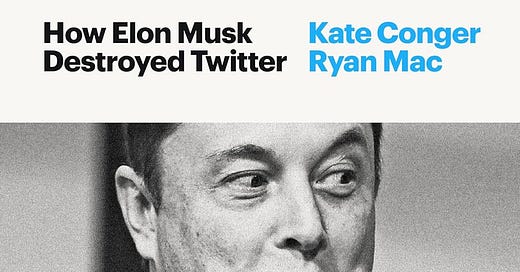Was Twitter ever good?
Surely, it had moments of goodness. When news was breaking — when there were elections, revolutions and natural disasters — Twitter was often the best place to go to get up to speed in a hurry. It was also capable of creating smart conversations, inspiring the best jokes, helping people make connections.
But it was also a place where “cancel culture” originated — the ability to pile on to some poor, unsuspecting schmuck for having the wrong opinion (or even a slightly wrong opinion) was irresistible to a lot of people: A few folks lost their livelihoods because they became Twitter’s main character. And to no small extent, Twitter gave us Donald Trump’s political career, which may well mean the end of American democracy as we know it. (The jury is still out on that one.)
Like pretty much all social media, Twitter was built for our lizard brains — to make dopamine-addicted monkeys like me mash “refresh” over and over again, part of a generational mindwipe that leaves most of us staring at our phones when we ought to be reading books or spending time with friends.
In that sense, Twitter contained the seeds of its own destruction.
Because one of those dopamine-addicted monkeys was Elon Musk, now and again the richest man in the world. He became infatuated with the platform, bought it, turned it into X — and, quickly, into a cesspool of grift, disinformation and racism that has caused many of its users to flee.
“Character Limit: How Elon Musk Destroyed Twitter,” by New York Times reporters Kate Conger and Ryan Mac, is an excellently reported account of how we got to this point — a depiction of how capitalism can go awry in the Internet age.
How so? A few examples:
When “shareholder value” is the highest value: Musk has called Twitter the world’s town square, and there was a time when that wasn’t far from being true. That arguably means that it had a value beyond pure profit. But when Musk made his offer to buy Twitter at $54.20 a share — a wildly inflated price, as everybody knew at the time, but an opportunity for Elon to make a pot joke — Twitter’s board had no choice but to take it. Twitter’s shareholders would never see such a great offer again. They knew that Musk was erratic, that it was likely he would wreak havoc. The cash was too good.
The problem with debt: Oddly enough, the world’s richest man didn’t buy Twitter out of his own pocket: He took big loans from big banks. Having saddled his purchase with debt — and again, having overpaid massively for it — Musk had little choice but to start slashing jobs and other expenses (like data centers!) turning a resilient platform rickety. This is actually an old story, especially in the newspaper industry. Private equity firms regularly buy up companies, load them up with debt, and then more or less strip them for parts. The results can be devastating.
The cult of the billionaire: Elon thinks he’s a genius. He might be where engineering is concerned. Where Twitter — which is less an engineering problem than a human one — he isn’t. But he doesn’t know that. He fires people for refusing to flatter him, or talking shit behind his back. He believes in his own infallibility, and others pay the price.
Job-linked healthcare: I’m not sure there are any heroes in this book. There are victims. The people I feel sorry for the most are the Twitter workers desperate to leave after Musk takes over but can’t because they have ill loved-ones and they can’t go without the health insurance the company provides.
What is X today? Well, it still has its uses. I get story ideas from it regularly. And I guess I prefer to ideologically homogeneous alternatives like Bluesky.
Elon Musk is using his social media network to spread election conspiracy theories about U.S. disasters — just as online falsehoods are complicating the federal response to Hurricanes Helene and Milton.
Musk has helped spread accusations that the Federal Emergency Management Agency “actively blocked” donations to victims of Helene and is “seizing goods … and locking them away to state they are their own” — allegations that FEMA officials call false and which run afoul of state and local Republican leaders’ praise for the assistance from Washington.
A study conducted by the Center for Countering Digital Hate found that in the first seven months of 2024, Musk’s false or misleading claims about the US election generated 1.2 billion views. “Elon Musk is abusing his privileged position as owner of a small, but politically influential, social media platform to sow disinformation that generates discord and distrust,” said Imran Ahmed, the center’s CEO.
And, well, you get the idea.
Was Twitter ever good? I wouldn’t make that claim. What’s now clear, though, is that it could become something worse. Thanks to Elon Musk, it did.






Thanks for turning me on to the book. I will check out. I just joined substack as Twitter has been killed. https://open.substack.com/pub/collegetowns/p/finally-admitting-twitter-is-dead
Happily, I never bought into twits or ex.